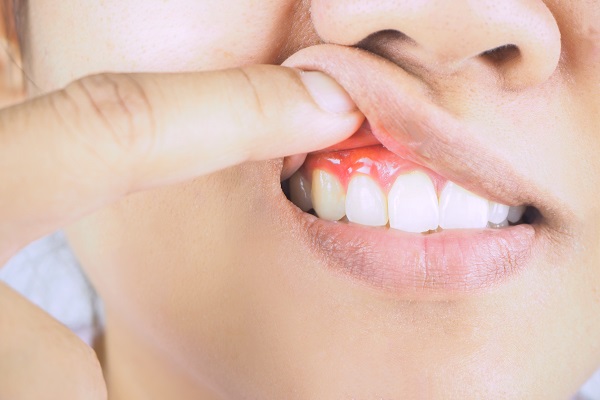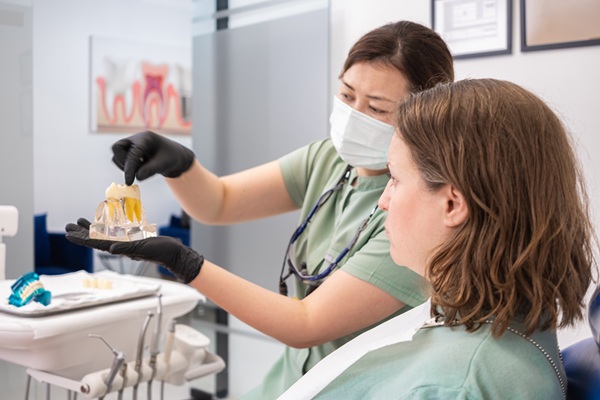What Are the Signs of Gum Disease?

Gum disease is often hard to avoid; however, once it is detected, patients can immediately visit their general dentist for a diagnosis and treatment plan. In order for it to be detected, the dentist will have to rely on any symptoms or signs that indicate a problem. Ready to learn more about the signs?
Signs of gum disease
The following signs indicate that gum disease is present.
Bleeding
Sometimes when patients brush or floss their teeth, they will notice bleeding. Minor bleeding from time to time is normal and quite common, however, if the bleeding is excessive, it may indicate gum disease. Bleeding indicates that the gums are not healthy and that there may be an infection. Rinsing with a saltwater mixture can help reduce bleeding and clear out infected areas, however, this is not a permanent solution. It is important to follow up with a general dentist for long-term treatment.
Red or white spots
The gums are supposed to be pink and soft, however, when gum disease is present, they may appear red or white. Red or white spots or patches on the gums are often signs that there is an abscess, which is a common symptom of gum disease. While it can be tempting to push on the areas, it is important not to. Instead, visit a general dentist immediately to have the spots examined.
Swollen or puffy gums
Swollen or puffy gums almost always indicate an infection. Typically, swelling occurs because there is an abscess or areas that have excessive buildup. When looking at the gums, it is important to see if they overextend past the teeth. If they do, it usually means they are severely infected. Just like with spots or patches, it can be tempting to press on swollen areas, but it is best to not, in order to avoid irritation.
Receding gums
One of the main indicators of gum disease is when the gums begin to recede. When they are receding, they essentially look like they are pulled back from the teeth. When there is a serious infection in the gums, the bone beneath will begin to deteriorate, which will ultimately cause the teeth to look longer and the gums look shorter. Receding usually takes place in the later stages of gum disease.
Pain
When the gums physically hurt, it is best to visit a general dentist. Pain usually indicates that gum disease is present or developing. Patients may experience pain when brushing along the gum lines or a dull pain that feels sore. Both can be managed by taking an over-the-counter medication for pain, but ultimately, a general dentist will need to diagnose and treat the problem.
Learn more today!
There are a lot of signs that indicate that gum disease is present, however, there are times when only a dentist can detect the infection. This is why it is extremely important to regularly see a general dentist. They can perform regular examinations and x-rays to detect and diagnose gum disease, at any stage. Reach out today to learn more or to get started!
Request an appointment here: https://dentistofmontville.com or call Montville Smiles at (973) 302-2079 for an appointment in our Montville office.
Check out what others are saying about our dental services on Yelp: Gum Disease in Montville, NJ.
Recent Posts
Gum disease is not a condition you should ever ignore. At the first signs of trouble, you should talk to your dentist about how to treat these issues and restore your gums to good health. While the dentist can recommend in-office treatment, there are also things you can do on your own. Along with good…
Scaling and root planing for gum disease is an often performed dental procedure that involves cleaning deep down toward the tooth root and below the gum line to remove built-up plaque and tartar. It is a more extensive form of routine dental cleaning and often necessary when treating advanced cases of gum disease.Minor instances of…
Having gum recession can be frustrating, aesthetically unpleasant, and detrimental to your oral health. If you have started noticing signs of gum recession, or you just want to ensure that it never develops, we have some tips that might be helpful for you to begin utilizing.It may sound like an obvious solution, but many people…
Preventive dentistry is a branch of dentistry that focuses on protecting your mouth against common dental issues like tooth decay and gum disease. It include simple things that you can do independently, like practicing oral hygiene, and procedures performed by dentists, like dental cleanings.Taking good care of your mouth makes you less likely to develop…


